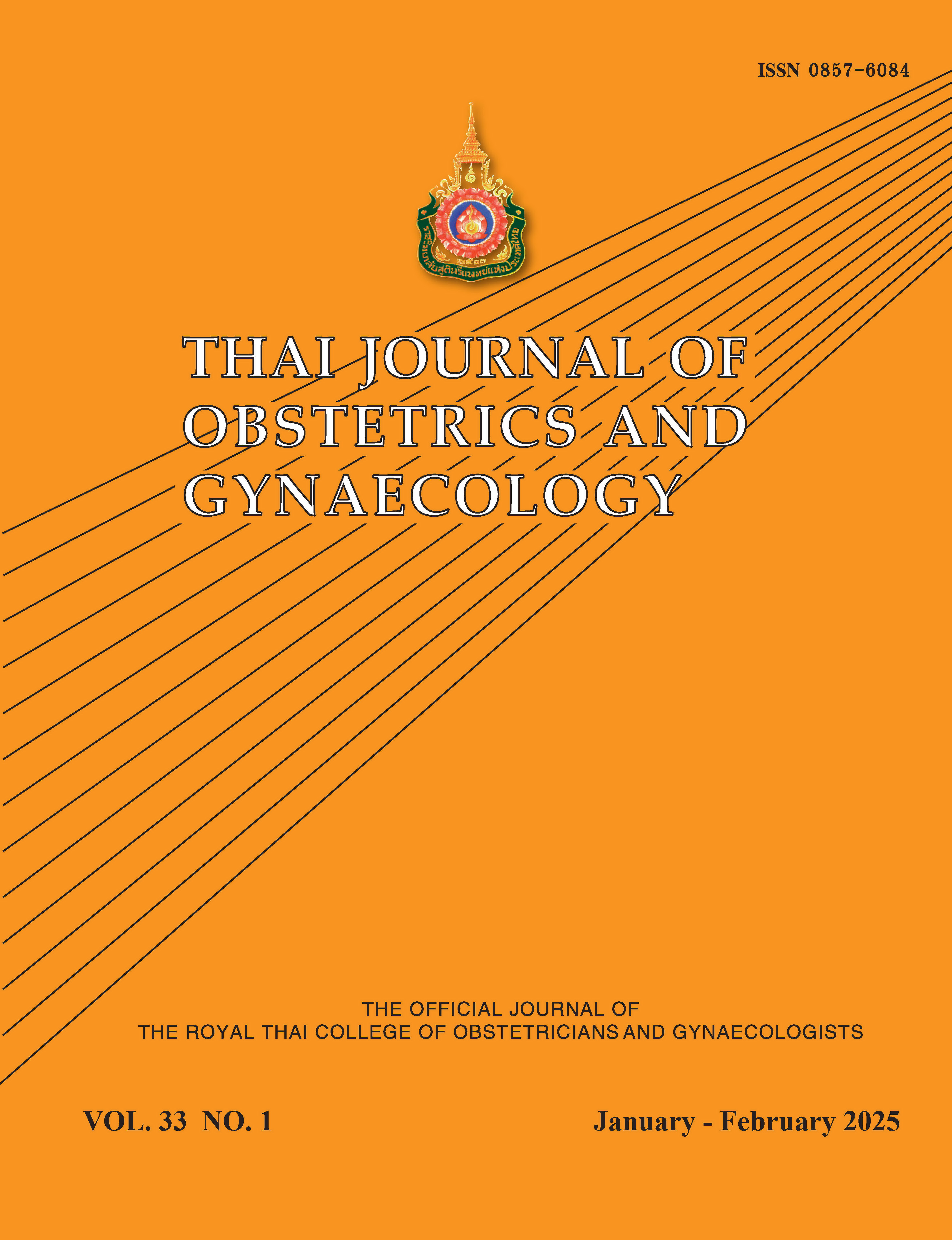Rate of Large for Gestational Age Newborns in Pregnant Women with Excessive Gestational Weight Gain
Main Article Content
Abstract
Objectives: To compare the rate of large for gestational age (LGA) newborns between pregnant women with excessive weight gain (EWG) and appropriate weight gain (AWG)
Materials and Methods: A retrospective cohort study was conducted on pregnant women who delivered term singleton newborns between July 2020 and December 2021 at Maharaj Nakorn Chiang Mai Hospital. Pregnant women were classified as EWG and AWG regarding their pre-pregnancy body mass index (BMI) and gestational weight gain (GWG). LGA newborn was defined as birth weight > the 90th percentile for gestational age. Rates of LGA newborns, neonatal birth weight, pre-pregnancy BMI, and maternal and perinatal complications were compared between EWG and AWG groups.
Results: There were 23.4%, 59.9%, and 16.7% of 1,182 pregnant women who had EWG, AWG, and poor weight gain (PWG), respectively. The rate of LGA newborns in the EWG group was statistically higher than in the AWG group (5.8% vs 2.8%, p = 0.026). Pregnant women in the EWG group had statistically higher neonatal birth weight (3,240 gm vs 3,080 gm, p < 0.001) and higher pre-pregnancy BMI (25.1 kg/m2 vs 22.0 kg/m2, p < 0.001) than in AWG group. Logistic regression analysis showed that obesity and nulliparity were the independent risk factors for LGA newborns.
Conclusion: EWG was associated with a higher rate of LGA in newborns and was likely to occur in women with higher pre-pregnancy BMI and nulliparity. This study emphasizes the importance of preconception counseling and pregnancy education on nutrition and weight gain.
Article Details

This work is licensed under a Creative Commons Attribution-NonCommercial-NoDerivatives 4.0 International License.
References
Macrosomia: ACOG Practice Bulletin, Number 216. Obstet Gynecol 2020;135:e18-e35.
Fetal growth disorders. In: Cunningham FG, Leveno KJ, Dashe JS, Hoffman BL, Spong CY, Casey BM, edtors. Williams Obstetrics 26th ed. NewYork: McGraw Hill 2022;832-4.
Weissmann-Brenner A, Simchen MJ, Zilberberg E, Kalter A, Weisz B, Achiron R, et al. Maternal and neonatal outcomes of large for gestational age pregnancies. Acta Obstet Gynecol Scand 2012;91: 844-9.
Zhang Y, Liu P, Zhou W, Hu J, Cui L, Chen ZJ. Association of large for gestational age with cardiovascular metabolic risks: a systematic review and meta-analysis. Obesity (Silver Spring) 2023;31:1255-69.
Institute of Medicine National Research Council. Weight gain during pregnancy: reexamining the guidelines. In: Rasmussen KM, Yaktine AL, editors. Washington (DC): National Academies Press (US); 2009.
Obesity: preventing and managing the global epidemic. Report of a WHO consultation. World Health Organ Tech Rep Ser 2000;894:i-xii,1-253.
Sunsaneevithayakul P, Titapant V, Pornpimol Ruangvutilert, Sutantawibul A, Phatihattakorn C, Wataganara T, et al. Relation between gestational weight gain and pregnancy outcomes. J Obstet Gynaecol Res 2014;40:995-1001.
Kiserud T, Piaggio G, Carroli G, Widmer M, Carvalho J, Neerup Jensen L, et al. The World Health Organization fetal growth charts: a multinational longitudinal study of ultrasound biometric measurements and estimated fetal weight. PLOS Med 2017;14:e1002220.
Goldstein RF, Abell SK, Ranasinha S, Misso M, Boyle JA, Black MH, et al. Association of gestational weight gain with maternal and infant outcomes: a systematic review and meta-analysis. JAMA 2017;317:2207-25.
DeVader SR, Neeley HL, Myles TD, Leet TL. Evaluation of gestational weight gain guidelines for women with normal prepregnancy body mass index. Obstet Gynecol 2007;110:745-51.
Perumal N, Wang D, Darling AM, Liu E, Wang M, Ahmed T, et al. Suboptimal gestational weight gain and neonatal outcomes in low and middle-income countries: individual participant data meta-analysis. BMJ 2023;382:e072249.
Harvey L, van Elburg R, van der Beek EM. Macrosomia and large for gestational age in Asia: One size does not fit all. J Obstet Gynaecol Res 2021;47:1929-45.
Lan X, Zhang YQ, Dong HL, Zhang J, Zhou FM, Bao YH, et al. Excessive gestational weight gain in the first trimester is associated with risk of gestational diabetes mellitus: a prospective study from Southwest China. Public Health Nutr 2020;23:394-401.
Qi Y, Sun X, Tan J, Zhang G, Chen M, Xiong Y, et al. Excessive gestational weight gain in the first and second trimester is a risk factor for gestational diabetes mellitus among women pregnant with singletons: A repeated measures analysis. J Diabetes Investig 2020;11:1651-60.
Hillier TA, Pedula KL, Vesco KK. Excess gestational weight gain. Obstet Gynecol 2008;112:1007-14.
Li Y, Liu QF, Zhang D, Shen Y, Ye K, Lai HL, et al. Weight gain in pregnancy, maternal age, and gestational age in relation to fetal macrosomia. Clin Nutr Res 2015;4:104-9.
Hua XG, Jiang W, Hu R, Hu CY, Huang K, Li FL, et al. Large for gestational age and macrosomia in pregnancies without gestational diabetes mellitus. J Matern Fetal Neonatal Med 2020;33:3549-58.
Obesity in pregnancy: ACOG Practice Bulletin, Number 230. Obstet Gynecol 2021;137:e128-e44.
Terada M, Matsuda Y, Ogawa M, Matsui H, Satoh S. Effects of maternal factors on birth weight in Japan. J Pregnancy 2013:172395.
Beta J, Khan N, Khalil A, Fiolna M, Ramadan G, Akolekar R. Maternal and neonatal complications of fetal macrosomia: systematic review and meta-analysis. Ultrasound Obstet Gynecol 2019;54:308-18.
Chavkin U, Wainstock T, Sheiner E, Sergienko R, Walfisch A. Perinatal outcome of pregnancies complicated with extreme birth weights at term. J Matern Fetal Neonatal Med 2019;32:198-202.
Barquiel B, Calvo M, Moreno-Domínguez Ó, Martínez-Sánchez N, Muner M, Bedate MF, et al. The PREDG study: A randomised controlled trial testing whether an educational intervention can prevent gestational weight gain in women with obesity. Clin Nutr ESPEN 2023;57:266-71.
Dewidar O, John J, Baqar A, Madani MT, Saad A, Riddle A, et al. Effectiveness of nutrition counseling for pregnant women in low- and middle-income countries to improve maternal and infant behavioral, nutritional, and health outcomes: A systematic review. Campbell Syst Rev 2023;19:e1361.
Harrison CL, Bahri Khomami M, Enticott J, Thangaratinam S, Rogozinska E, Teede HJ. Key components of antenatal lifestyle interventions to optimize gestational weight gain: secondary analysis of a systematic review. JAMA Netw Open 2023;6:e2318031.


